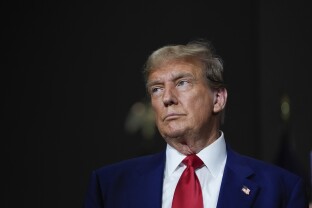President Donald Trump is set to speak on Tuesday at the General Assembly of the United Nations, an organization he’s hit with funding cuts as major conflicts rage overseas.
The White House told NOTUS Trump’s address will focus on sovereignty and liberty in addition to ensuring the United Nations “delivers on their core mandates.”
Peace will be another major theme: The Trump administration has dubbed the president “peacemaker-in-chief” for his efforts to end a number of conflicts abroad. Secretary of State Marco Rubio and Ambassador to the United Nations Michael Waltz, freshly confirmed by the Senate on Friday, are also expected to attend.
Trump “will lay out his vision for a safe, prosperous, peaceful America and world,” White House spokesperson Davis Ingle said. “Under President Trump’s leadership, our country is strong again, which has made the entire globe more stable. In only eight months, the President has brokered seven peace deals, secured historic trade deals and investments, and strengthened alliances across the world.”
But for all his talk of peace, Trump’s remarks will take place as conflicts continue around the globe, and as the White House finds itself at odds with other nations on how to handle some of them.
Most U.N. member countries recognize a Palestinian state; the U.S. does not. And some U.N. experts have condemned the Trump administration’s military strikes on suspected drug smuggling boats in international waters as “extrajudicial.” The White House has continued to claim that its actions have been lawful.
The wars in Ukraine and Gaza are expected to be major issues at the U.N. assembly. Russia controls about 20% of Ukraine, more than 65,000 Palestinians have died in Gaza and 20 living Israeli hostages remain in Hamas captivity.
The U.S. will once again be in the position of maintaining its support of Europe while being cognizant of the widening humanitarian crisis in Gaza, where Palestinians are experiencing what António Guterres, secretary-general of the United Nations, has called “a humanitarian catastrophe of epic proportions.” On Sept. 16, a U.N. commission concluded that Israel was committing genocide in Gaza, finding that Israeli security forces committed four of the five genocidal acts defined by the 1948 Genocide Convention. Only a handful of American officials have said as much.
The State Department blocked Palestinian officials from attending the UNGA, but experts and observers expect to see a push for a two-state solution, and to a lesser extent, Palestinian statehood.
Trump “is fully aware that the U.N. is coming across as more favorable to the Palestinians,” said Asha Castleberry-Hernandez, a senior adviser at the Department of State during the Biden administration. “He may or may not say he wants a two-state solution, but he’s definitely going to criticize Hamas. He’ll say we need to continue to support the hostage affairs issue, and surge humanitarian support in the Gaza crisis.”
It’s unclear how Trump will address the ongoing war between Russia and Ukraine, which he said last week has been more difficult to end than he expected. Experts predicted his comments on the issue could range from criticizing Putin to focusing on his own efforts to end the war.
Castleberry-Hernandez told NOTUS she expects Trump to explain the U.S. military’s strikes on boats that the administration says were smuggling drugs from Venezuela to the U.S., and take the opportunity to criticize Venezuelan President Nicolás Maduro.
Stewart Patrick, director of the Global Order and Institutions Program at the Carnegie Endowment for International Peace, told NOTUS he expects a few countries to address what he said appears to be “a pretty obvious violation of international law” and bemoan the erosion of international law generally, citing Russia’s incursions into neighboring states.
Through both executive order and a pocket rescissions request, Trump withdrew the U.S. from the United Nations Human Rights Council and the United Nations Educational, Scientific and Cultural Organization, and left a $500 million-sized hole in the U.N.’s budget. According to the White House, Trump’s remarks will also promote “burden sharing.”
The administration has justified the cuts by saying the U.N. has failed to deliver on its mandate and that much of the U.N.’s funding comes from the U.S., which Trump views as unfair.
The administration has gone as far as to say that some parts of the U.N. don’t align with American values.
Patrick said he expects that Trump could put the U.N. on notice by taking “an a la carte approach to the United Nations, supporting those things that the administration favors and restricting funding from those that it doesn’t.”
Trump, favoring bilateral relationships, is leaving a void in the multilateral global order. Foreign policy experts say other countries — like China, are rushing to take the U.S.’s place.
“I think that it opens a massive gaping hole in which China is easily walking through. In the past, China has had to compete with the United States by expending some shoe leather in the corridors of the United Nations and then also in the capitals of member states, but in a sense, the United States is taking its ball and leaving the field,” Patrick said.
Sign in
Log into your free account with your email. Don’t have one?
Check your email for a one-time code.
We sent a 4-digit code to . Enter the pin to confirm your account.
New code will be available in 1:00
Let’s try this again.
We encountered an error with the passcode sent to . Please reenter your email.


